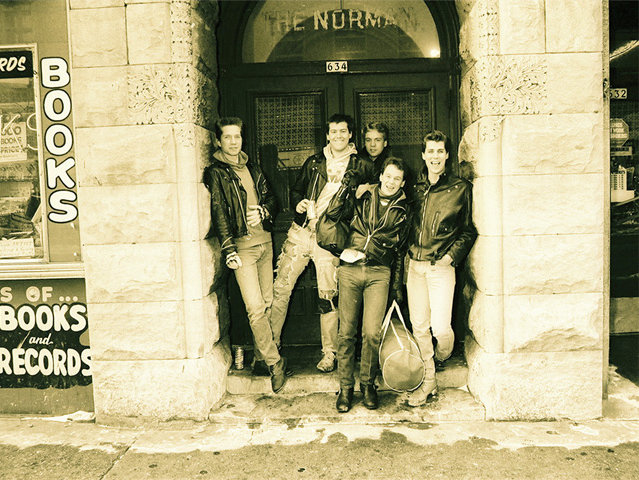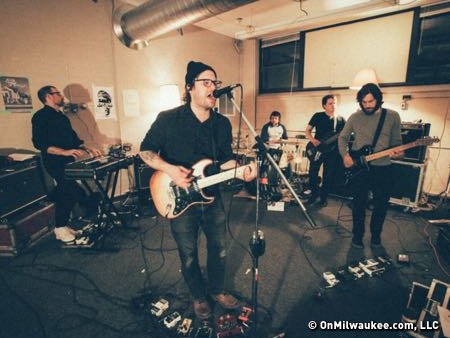For a city the size of Milwaukee, the sheer number of bands that have tread the boards on local stages is mind-boggling. There are literally hundreds active at any given time and during especially fertile periods, like the punk rock and new wave fueled late ‘70s and early ‘80s, clubs like The Starship and Zak’s were among the most exciting places to be in Brew City.
Sadly, little has been written about those periods in Milwaukee music history. Now, Steve Nodine, who was part of the scene during that era as a member of Dark Facade, has self-published "Cease is Increase: An Oral History of Milwaukee’s Punk and Alternative Music Scene."
Sparked by the patter on a Facebook group for members of that scene, Nodine spent three years interviewing local musicians. The result is a book that runs close to 500 pages long, and Nodine says he had to cut about 100 pages just to get it to that more manageable size. Nodine is already at work with a copy editor on a corrected second edition.
Starting out with ‘60s bands like The Shag, The Baroques and The Velvet Whip and tracing the original, "alternative" live music scene here through Death and The Electric Assh*les and into the meat of the punk era with The Haskels and In a Hot Coma and beyond into the post-punk early ‘80s bands like The Violent Femmes, Plasticland, Die Kreuzen and others.
We talked to Nodine about the scene, the book and the party he’s hosting to launch "Cease is Increase," which is available for purchase here.
OnMilwaukee.com: What led you to write "Cease is Increase"?
Steve Nodine: Since the day I walked away from the music scene in 1986 in grieving for my musical partner, David Wolf ... I have always looked back at those days as being the best times of my life. I kept up with the music trends over the years, but no longer went out to shows, and lost touch with all my old cohorts.
With the advent of Facebook, I slowly started to connect with not only my old buddies, but acquaintances that shared the memories of those times that we all held close to our hearts. As I read the posts I began to realize what a fantastic story was being told in these threads of conversation.
I kicked around the idea of a book with my friend Keith Brammer. Keith turned my on to some books written in the "oral" tradition, including "Please Kill Me" and "We Have The Neutron Bomb." I agreed that this would be the best approach. So, I began my quest to interview as many people from the scene as possible.
OMC: How did you decide exactly where to begin and end in terms of time frame?
SN: From my conversations, I realized that each new generation of musicians are influenced by those who came before them. It made sense to start off with the early ‘70s. The book ends around 1986 when the drinking age went up to 21. The live music community really took a hit from this legislation. It became nearly impossible to pack the house any longer.
OMC: It's a pretty massive book. Did you expect it would grow into as big a project as it did?
SN: In the beginning I didn’t think that it would be more than half the 430 pages it ended up at. There were so many good stories being told, I actually had to go back and prune out about 100 pages. So, I have only kept the best stories and the scope is limited to how important I thought the bands were in terms of the big picture.
OMC: You were there for a lot of what transpired, I assume, but were there folks you didn't really know before, bands you hadn't seen?
SN: I played in bands from 1980 to 1986. I had a pretty large group of friends and acquaintances. I did have to rely on people like Clancy Carroll to help connect me up with people I didn’t know, but knew of and wanted to interview.
OMC: Were there any big surprises for you, things you didn't expect?
SN: Many people talk about the success of the (Violent) Femmes as being Milwaukee’s only collection to "make it," however there are many bands that had record contracts, although not as successful as the Femmes, the made a mark nonetheless. Bands like Yipes!, Colour Radio, Plasticland and Die Kreuzen all achieved success, albeit a different kind of success.
OMC: Did you have a favorite interviewee?
SN: My favorite interview was with Voot Warnings. He is such a funny guy. He speaks eloquently and is just entertaining as hell.
OMC: Looking back, do you think Milwaukee had an especially vibrant rock and roll scene during that era?
SN: Yes, I do. We got gripped by record companies, but the fans in Milwaukee could go out to Zak’s or The Starship and see original music. We had a group of musicians who were connected to each other. It was a family. While we might not have been a hub for record company signings, like Atlanta or Cincinnati, but we had a well-rounded group of dedicated fans and bands.
OMC: What made it special?
SN: The people first and then the music. We had great bands like Ama Dots, Oil Tasters, Sacred Order, Crusties, Shivvers. We were entertained.
OMC: Any plans to do a follow-up?
SN: A possible second edition to reformat and add in bands I missed. I would do a part two, 1986 to the present, if there is enough interest in this book.
OMC: Tell us a bit about the event for the book.
SN: On Saturday, July 13, I am hosting a party to celebrate the release of the book at Shank Hall. The evening starts off with a book signing reception at 7:30 which will feature food from Beans and Barley, while it lasts.
At 9 Rockford’s Love and Law take stage, featuring The Tense Experts’ Bobby Steele. Next up is my band The Newly Damaged, featuring myself, Kirk McFarlin and Kelp Chofs. Closing the night is Bicentennial Rub featuring Liquid Pink’s Peder Hedman.
The event is a celebration of the release of the book. After three years I have a lot to celebrate!
Born in Brooklyn, N.Y., where he lived until he was 17, Bobby received his BA-Mass Communications from UWM in 1989 and has lived in Walker's Point, Bay View, Enderis Park, South Milwaukee and on the East Side.
He has published three non-fiction books in Italy – including one about an event in Milwaukee history, which was published in the U.S. in autumn 2010. Four more books, all about Milwaukee, have been published by The History Press.
With his most recent band, The Yell Leaders, Bobby released four LPs and had a songs featured in episodes of TV's "Party of Five" and "Dawson's Creek," and films in Japan, South America and the U.S. The Yell Leaders were named the best unsigned band in their region by VH-1 as part of its Rock Across America 1998 Tour. Most recently, the band contributed tracks to a UK vinyl/CD tribute to the Redskins and collaborated on a track with Italian novelist Enrico Remmert.
He's produced three installments of the "OMCD" series of local music compilations for OnMilwaukee.com and in 2007 produced a CD of Italian music and poetry.
In 2005, he was awarded the City of Asti's (Italy) Journalism Prize for his work focusing on that area. He has also won awards from the Milwaukee Press Club.
He has be heard on 88Nine Radio Milwaukee talking about his "Urban Spelunking" series of stories, in that station's most popular podcast.



%20copy.jpg)



